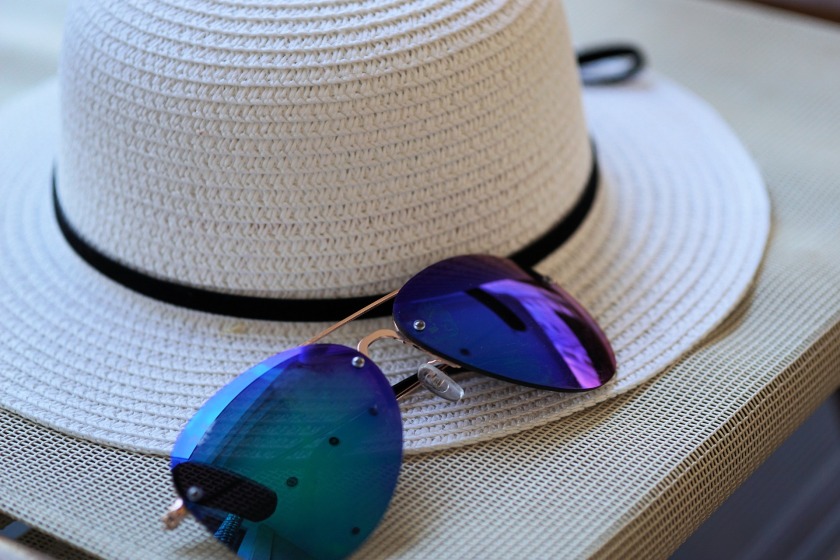The weather has been glorious here in the UK, which means out come all the warnings to apply sunscreen copiously and frequently. It also means out come all the warnings that chemicals in sunscreen are dangerous.
But what does the science say?
Types of sunscreen
There are two main types of sunscreen: chemical or mineral. Chemical sunscreens contain chemical UV filters such as octinoxate and oxybenzone and some have retinyl palmitate added to them. Mineral sunscreens contain mineral compounds like titanium dioxide and/or zinc oxide. Chemical sunscreens absorb UV light and convert it whereas mineral sunscreens are reflective and act as a physical barrier. This means mineral sunscreens are often thicker and have a less pleasant texture on the skin and they leave your skin a little ghostly.
Chemical sunscreen – the warnings
When we see warnings about the dangers of sunscreen it tends to be related to three things:
- Does chemical sunscreen cause skin problems such as contact dermatitis?
- Does chemical sunscreen cause cancer?
- Does chemical sunscreen cause birth defects?
So what are these concerns based on?
Contact dermatitis
Some people have skin reactions to chemical sunscreens – this occurs in less 1% of users and can be a response to fragrances, preservatives or the UV absorber itself. Sensitivity can develop after using a particular formulation for a long time. If you have a sensitive reaction to sunscreen you can try switching formulations, or you can switch to mineral sunscreen which is less likely to cause a reaction. And of course, see your doctor if you’re worried.
Causing cancer
Some studies suggest that oxybenzone can cause hormonal changes in cells grown in the lab. These hormonal changes have been confirmed in animals like mice but have not been reliably shown to occur in humans. Hormone changes can cause cancer so some people believe that oxybenzone can cause cancer. To date this has not been shown to be the case. Oxybenzone has not been shown to cause the DNA mutations needed to cause cancer and hormonal changes are not always linked to cancer. This evidence is insufficient to prove any link between oxybenzone and cancer.

Retinyl palmitate is sometimes found in sunscreen. Retinyl palmitate is derived from retinol or vitamin A and it acts as an antioxidant. Retinol generates reactive oxygen species (ROS) when exposed to UV radiation and ROS are able to damage DNA. This is the basis for the concerns that Retinol will cause cancer.
Studies in mice did not show that retinol combined with UV radiation causes cancer. There is no data published in humans to suggest that retinyl palmitate causes cancer.
A recent meta-analysis confirmed that there is no evidence supporting an increase in cancer risk caused by sunscreen use.
Causing birth defects
There is evidence that medicinal retinol pills can cause birth defects however this has not been shown to be the case with topical retinol application. Still, as a precautionary method it is advisable that pregnant women do not use a sunscreen containing retinols for the duration of their pregnancy.
The context
It is important to note that while there may be some evidence suggesting some level of risk associated with chemical sunscreen – this must be taken within the wider context.
There are two main types of skin cancer – melanoma and non-melanoma skin cancer. Non-melanoma skin cancer includes basal cell carcinoma and squamous cell carcinoma and is largely treatable if it’s caught early. Non-melanoma cancers are the most common type of cancer. Melanoma skin cancer is an invasive form of cancer that is the 5th most common and at late stages is usually considered incurable. At early stages it is highly treatable but this form of cancer can progress rapidly and requires early intervention. Both types of skin cancer are on the rise in the UK and this is linked to increasing sun and sunbed exposure. UV light exposure accounts for 86% of all melanoma cases, in the UK. Studies in Australia have shown a reduced rate of melanoma with regular sunscreen use.
Does sunscreen prevent cancer?

There is evidence that regular sunscreen use reduces pre-cancerous conditions and prevents skin cancer. However, the research into the efficacy of sunscreen is highly variable. This is partly because people are prone to using sunscreen in order to extend their time in the sun and misunderstand the most effective ways to use sunscreen.
Chemical sunscreens should be applied to the skin 30 minutes before going into the sun and should be reapplied every two hours or more often if you are perspiring or swimming. Even waterproof sunscreen will be removed by towelling down after a swim. Sunscreen does prevent sunburn however research shows that people who only rely on sunscreen to protect themselves from UV damage burn more often than people who also practice sun avoidance habits. A person who has suffered sunburn more than twice in their life is twice as likely to get melanoma.
So what should you do?
While there is evidence that chemical sunscreens can have some detrimental effects on the body – the evidence is overwhelmingly clear that over-exposure to UV light causes skin cancer. Not only that, the research shows that the benefits of using sunscreen far outweigh the risks. Unless you are completely avoiding any UV light exposure then in my opinion, using sunscreen is a risk worth taking.
In addition to wearing sunscreen and reapplying regularly, you should aim to avoid direct sunlight during the hottest hours of the day or wear clothing that covers your skin. And don’t forget, you might not burn through glass but you can still get UV skin damage through glass!


